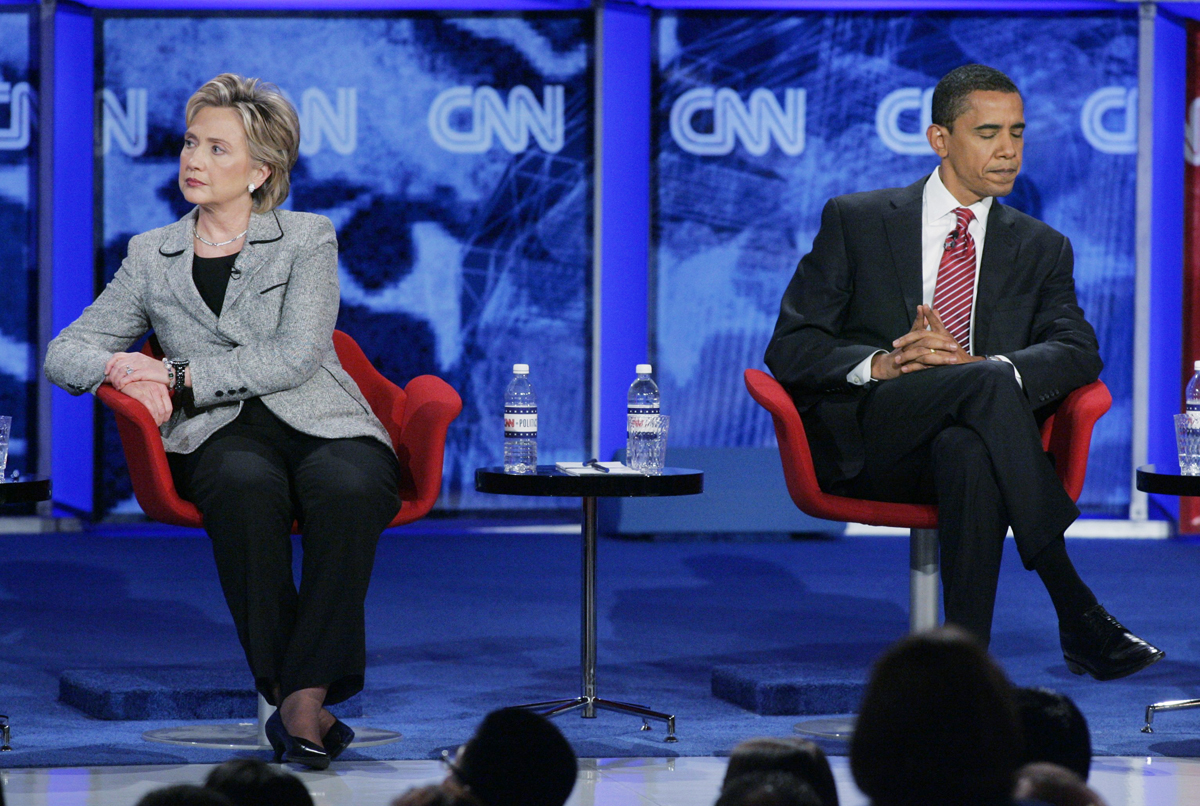by Frida Ghitis
Yes, Hillary Clinton is running for president, and she is running away from President Barack Obama’s record on foreign policy.
That’s a very clear message from the interview just published in The Atlantic in which she drew sharp distinctions between her view of America’s role in the world and those of the President, while also expressing significant disagreements with him over the right approach to ongoing crises in the Middle East.
In a dramatic dismissal of the Obama administration’s self-described foreign policy doctrine of “Don’t do stupid stuff,” Clinton declared, “Great nations need organizing principles and ‘Don’t do stupid stuff’ is not an organizing principle.”
Clinton clothed her criticism in respect of her “incredibly intelligent” former boss, but Obama may have clenched his jaw with irritation when he read the polite pummeling from his former secretary of state. Clinton promptly explained that even she didn’t think that Obama really meant that is his foreign policy doctrine. (The name Obama used to describe the policy, incidentally, uses a four-letter word instead of “stuff.”) She claimed that the catchy phrase was an effort to convey to Americans wary of U.S. misadventures in faraway lands that he was not about to do “something crazy.”
Still, Clinton articulated a vision for a much more assertive U.S. role in the world, one that contrasts sharply with Obama’s. In doing so, she brandished a lacerating analysis of the administration’s foreign policy. Most troubling for Obama was her intimation that some of the most difficult, dangerous and deadly problems raging in the Middle East today might have been avoided if Obama had acted more promptly and less hesitantly.
The interview with The Atlantic’s Jeffrey Goldberg was a landmark moment in her quest for the office. She has made the big break with Obama and filled out an important part of her job application, telling Americans concerned about the country’s place in the world why they should vote for her.
Like any statement made by a political candidate, there were unmistakable political calculations in her well-chosen words. It is clear that she believes her biggest political challenge lies on the right, not on the left, if nothing happens to dissuade her from running, which she evidently wants to do. The strategy is already that of a nominee, safe in the support of her party, seeking to peel away centrist voters and even conservative voters in the general election rather than courting the Democratic base in the primaries.
Many in the base, the hard-core, left-of-center Democrats, will resent her implied denunciation of Obama’s cautious style which, she contended, has swung too far in the opposite direction after the Bush years.
“When you’re down on yourself,” she said, “when you’re hunkering down and pulling back, you’re not going to make any better decisions than when you were aggressively, belligerently putting yourself forward.” The government, she said, has a tendency to swing between those extremes.
She proposes a midcourse. “We’ve learned the limits of America’s power to spread freedom and democracy,” she acknowledged, “but we’ve also learned the importance of our power, our influence, and our values appropriately deployed and explained.” Right now, she argued, “We don’t tell our own story very well.”
When the Soviet Union fell, an ideological vacuum was filled by dangerous ideologies. Clinton appears to view Islamic extremism as the foremost foe facing America. She also is concerned about muscular nationalism of the kind Russian President Vladimir Putin is utilizing to spread Russia’s influence.
America’s main threats are Jihadi groups, now controlling territory in Syria and Iraq and determined to expand; Clinton views them as ideological enemies of the United States. “I’m thinking a lot about containment, deterrence, and defeat,” she said, drawing a parallel with the Cold War era.
She did not push back against the suggestion that the rise of the Islamic extremists of ISIS might have been prevented if Obama had armed Syrian moderates three years ago.
Although he has approved increased support, Obama has rejected the notion that “former farmers or teachers or pharmacists” in the opposition could have succeeded with U.S. help. But Clinton disagrees. By failing to arm a force of carefully vetted moderates, the United States made it possible for extremists to take over the fight. Some of those extremists, who have captured large swaths of Syria, are now in Iraq, where Obama reluctantly agreed last week to intervene in what is a strategic and humanitarian calamity.
Clinton took what appears to be a harder line than the administration on nuclear negotiations with Iran. She laughed in describing Iranian Supreme Leader Ayatollah Ali Khamenei’s position “that they don’t have any intention of having a nuclear weapon but they nevertheless want 190,000 centrifuges.” She rejected Iran’s claim that it has a right to enrichment, and said America’s stance should allow only a minimal number of centrifuges for research purposes.
Regarding Israel and the Palestinians, she spoke in words that Israel’s supporters will find reassuring. “There’s no doubt in my mind that Hamas initiated this conflict.” Israel, she said emphatically, “has the right to defend itself.” That is something Obama has said repeatedly, but Clinton spoke much more forcefully than the Obama administration has.
Regarding civilian casualties, she spoke of the difficulty of fighting an enemy embedded in civilian areas. “The ultimate responsibility,” she said, “rests with Hamas.”
Hamas, she said, is not a group the United States could work with, given its commitment to the destruction of Israel, “married to very nasty tactics and ideologies, including virulent anti-Semitism.” Clinton argued that international criticism of Israel and disproportional attention to what it does is partly the result of anti-Semitism, particularly in Europe.
She listed the many times Israel has made far-reaching peace proposals to Palestinians. “I don’t care about revisionist history,” she said. “I know that (Yasser) Arafat walked away,” and expressed sympathy for Prime Minister Benjamin Netanyahu’s position on a military withdrawal from the West Bank. “If I were the prime minister of Israel,” she said, “You’re damn right I would expect to have control over security, for a number of years.” “With Syria and Iraq,” she said “it is all one big threat.”
It is no secret that Clinton has advocated a much more internationally engaged, muscular and even ideological foreign policy, aimed at promoting America’s values, which “also happen to be universal values.”
She has now cast herself apart from the Obama administration on key aspects of world affairs, and sent a message to centrist voters, and to international audiences, that a Hillary Clinton administration would not look like its predecessor’s.

Frida Ghitis is a world affairs columnist for The Miami Herald and World Politics Review. A former CNN producer and correspondent, she is the author of “The End of Revolution: A Changing World in the Age of Live Television.” Follow her on Twitter @FridaGhitis.
The opinions expressed in this article are solely those of the author.







